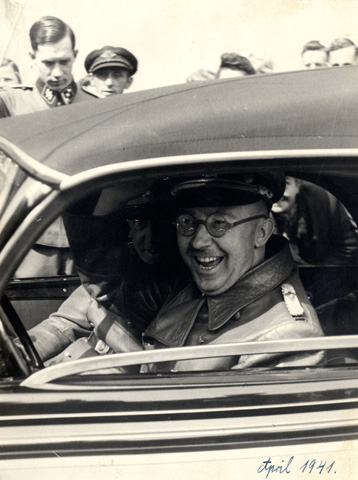
Heinrich Himmler in 1941 (Kino Lorber, Inc.)
Heinrich Himmler -- the Nazi Gestapo chief, head of the German police in the Third Reich, head of the Reich Main Security Office, and Reich Minister of the Interior -- was born to a Catholic family Oct. 7, 1900, in Munich. His father, Gebhard Himmler, was a tutor to Prince Heinrich of Bavaria, who in turn was young Heinrich's godfather.
Heinrich was a good student but poor athlete, and his father used his influence with the royal family so that Heinrich could enter officer training during World War I. With Germany's loss, Heinrich completed his education and went to university to study agronomy and earned a diploma in agriculture. As Germany suffered from the dictates of the Treaty of Versailles and inflation devastated the country, Himmler became politicized to the radical right. He met Ernst Röhm, an early member of the Nazis, and joined a paramilitary group. Mildly anti-Semitic at first, Heinrich by 1922 was deeply interested in the "Jewish question." Himmler joined the Nazi Party in 1923.
Himmler began keeping a diary at about the age of 10, and by the time he reached his 20s, he was recording much in his diaries. He met his future wife, Margarete Boden, on a train in 1927, and they began exchanging frequent letters. They married the next year and would have one child, a daughter, Gudrun, born in 1929.
As a member of the SS since 1929, Himmler rose through the ranks of the Nazi Party beginning in 1936 as chief of the German police in the Reich Ministry of the Interior. He became one of the main architects of the Holocaust and was responsible for countless massacres and atrocities and the construction of the first three extermination camps at Bełżec, Sobibór, and Treblinka.
For all the horror perpetrated by Himmler, the main theme that runs through his writings, including letters to his wife and daughter, is the necessity, the imperative, for a person to be a decent human being. The tragic irony deftly revealed by "The Decent One" is that Himmler considered himself to be a scion of decency while millions of innocent people died at his hand. Even as he kept a mistress and fathered two more children out of wedlock during the height of the war, his self-image remained intact, the hubris of his self-delusion ending only when he swallowed a cyanide capsule as the Allies advanced.
"The Decent One" is a documentary by Israeli filmmaker Vanessa Lapa. In 1945, the Allies discovered a secret cache of letters and photographs in Himmler's home in Bavaria. These made their way to Tel Aviv, where they were hidden away for years but were finally sold to Lapa's father. In the film, Lapa weaves together Himmler's life through these artifacts and restored film footage from German archives. She does not judge or condemn by adding voice-over narration. She does not have to. By using Himmler's own words, he condemns himself.
I think "The Decent One" is an important, even compelling, contribution to Holocaust filmography. As racism and anti-Semitism continue to rise in Europe and the United States, understanding the life and mind of an anti-Semite who rationalized a way to murder so many people because of race is an educational imperative.




